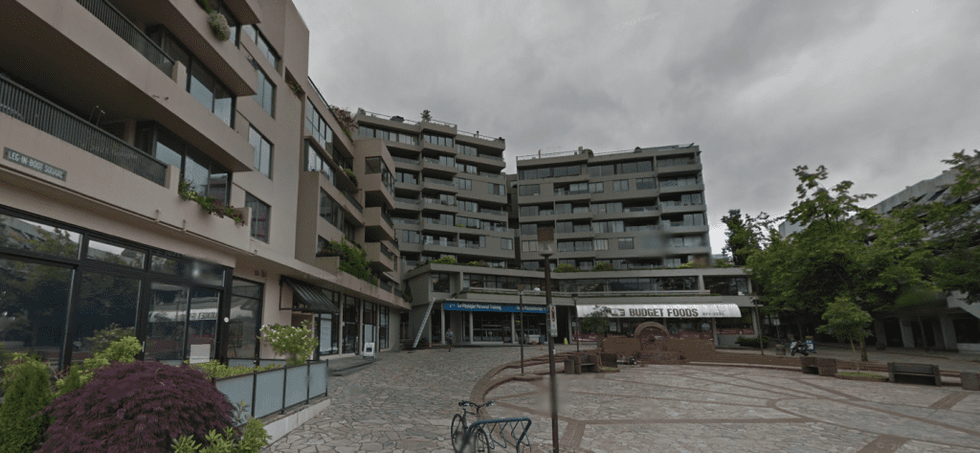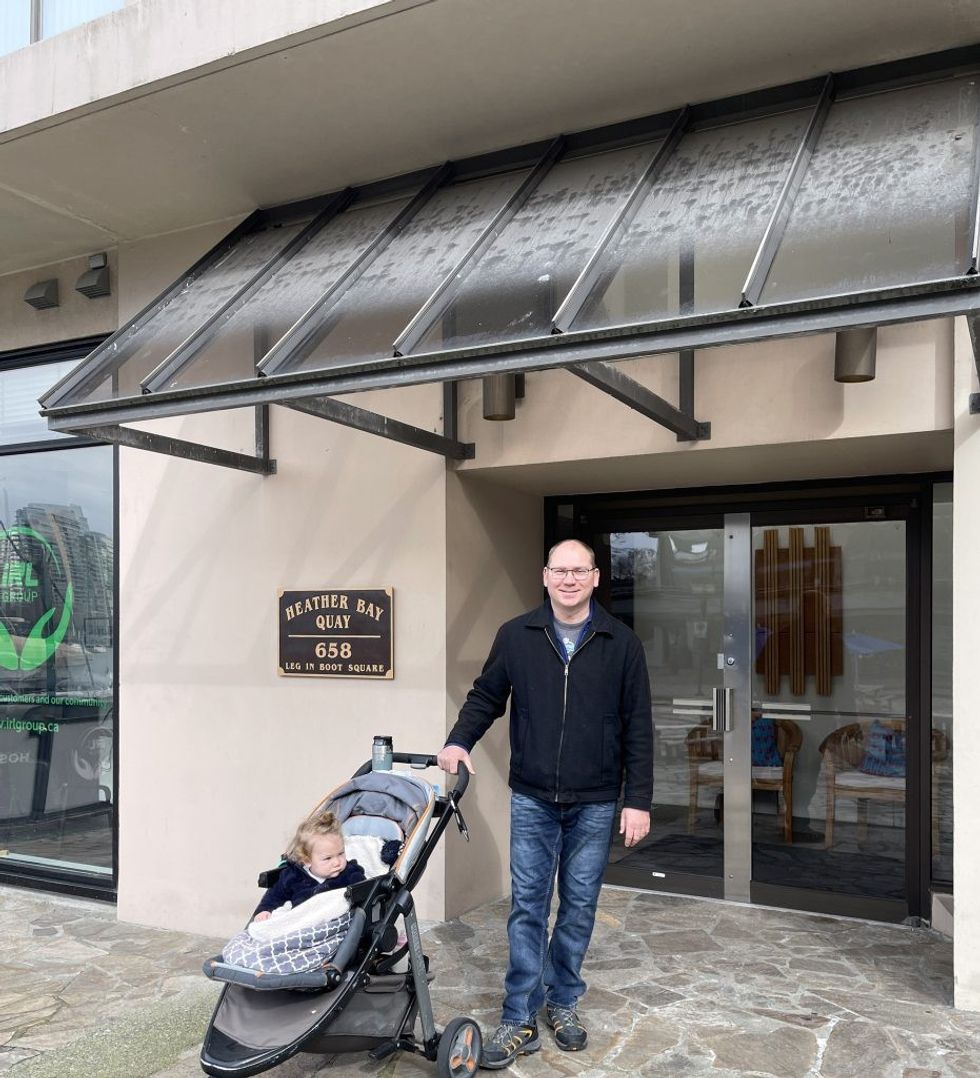Some False Creek South condo owners on leasehold land say they would be over-charged by a total of $660,000 in prepaid lease payments, on offer by the City.
There are 53 units between two leasehold strata buildings on city-owned land that are being over-charged, according to strata owner and retired planner Robert Renger, who worked for the City of Burnaby as a development planner for 33 years. Renger is looking at a $13,000 over charge for his own prepaid lease, he says.
In the past, when renewing the leases the city had been clear that its calculation was based on square footage of the units. But back in the 1970s, at the start of the stratas, surveyors incorrectly included balconies and patios in the floor space calculation of some units. That was a problem because the size of the units determined the lease amounts. In 1999, strata owners identified the error. The city refunded 35 owners $135,000 for past lease prepayments, which involved three of 10 strata buildings.
With leases coming due again in 2036, prolonged negotiations have been underway for another extension and a society was set up to represent the owners. The city finally offered a 20-year extension on their leases, based on a more general aggregate land value of the units. But a group of residents say that the new method lacks transparency and the city repeated the same old error. The strata buildings impacted are at 666 and 658 Leg in Boot Square.

“Fifty three [units] out of 669 are being hard done by this. The majority was so anxious to get their 20-year extensions and I think the negotiators as well, that they accepted anything the city threw at them,” says Renger. “The city knows there is this discrepancy but they continue to take advantage of it.”
Renger represented the residents when the floor space error was identified 24 years ago. Back then, the city had hired an independent consultant to re-calculate the sizes of the units in question. The condo units were built when strata-titled properties as a legal entity were new, and floor space errors were common.
This time around, the city says the aggregate land value was fairly determined and is no longer a matter for debate.
READ: Strand To Develop Two 19-Storey Rentals In Vancouver’s False Creek Flats
“There was nothing about the methodology about how it was calculated. It was, ‘here are the values for your buildings and here are the terms of the lease. Do you want to accept it or not?’” says Cameron Fast, president of the strata at 658 Leg in Boot Square.
“To be fair, not all stratas are in same position as us. We are a minority,” says Fast. “We’ve thought about getting a lawyer but we are a small strata, and it’s expensive.”
A Strata Leaseholders Society had been set up to negotiate terms on behalf of most of the owners and they established a memorandum of understanding with the city. In response to the MOU, Fast wrote to the deputy city manager and argued some of them would be making payments “disproportionate to the actual land value.”
Fast says the city combined the two strata buildings and used a floor area figure that was off by a total of 4,780 sq. ft. However, the floor area numbers weren’t included in the final draft of the MOU.
The SLS negotiators eventually accepted the aggregate land values, to the irritation of some strata owners most affected by the lease amounts. Renger says it didn’t help that the city negotiators said the lease extension wouldn’t go to council if they kept arguing over the ground rent. Some residents were concerned that they could one day lose their homes without a renewed lease. A leasehold property that’s running out of time rapidly loses value.
Owners prepay their leases upfront instead of monthly. Fast estimates that those impacted are looking at an average of $12,000 extra in payments, which would be paid as part of the lump sum, due upon acceptance of the new lease. The offer expires in February 2028, so they have a few years to decide.
In an email response, the city said that the SLS, of which Renger is a director, was given the opportunity to consider and vote on the package offered and 91% of members voted in favour of the MOU.
“Going forward, the City is offering lease extensions to each individual lessee based on the MOU terms and conditions,” says the city. “It will be up to each individual lessee to choose whether to accept the offer to extend their lease, or to forgo this lease extension offer, in which case their current lease terms and length will remain unchanged.”
The city’s position is that the two sides had agreed that lease prices would be based on the aggregate land value determined during negotiations.
“This was done intentionally to avoid disagreements over building floor areas,” says the city. “With this approach, the inclusion or exclusion of certain building elements is not material.”
If an owner rejects the city’s offer, it’s not clear what would happen when their lease expires in 2036.
Strata owner Joanne Nickel moved into her False Creek building six years ago and has one of the larger units; she believes she’s being over-charged by $20,000. She didn’t want to go public with total amount she owes for her prepaid lease, but she said the average amount is around $200,000.
Some people wanted to push on with accepting the terms because they are aging out or downsizing and looking to sell, she said. With another 13 years left on their leases, plus the 20-year extension, that gives them 33 years, a decent amount of time to get mortgage approval and make their units marketable for resale.
But Nickel plans to stay in her waterfront unit. She knows that some people won’t sympathize because her leasehold price was far below freehold price for a comparable unit, especially for a waterfront condo on the city’s west side, near downtown. Leasehold units, however, don’t hold their value like freehold properties.
The city has plans to add density to the neighbourhood, facing an increasing population and an affordable housing crisis. They are a community feeling the pressure of pending change.
She understands why other residents would want to accept the offer and get on with their lives.
“We are a small building and a number of people have lived here for 30 odd years… people were desperate, especially if you are aging out or you are downsizing. It made it really difficult. I will say there was a lot of stress in the community.”
They have another major concern and that’s a modification to the formula used in the city’s purchase price paid to the strata owner at lease end.
“Some of us believe the lease modifications will result in termination payments that are far below the freehold value of the lot,” says Renger.
Their understanding of the new terms is that there’d be a deduction from their unit value, according to the “residual land value.” If the city-owned land it sits on is worth more than the value of the unit, which is entirely conceivable, then the unit could be worth zero. The concern is that if it’s a negative value, the owner could owe the city, he says.
For that reason, he and others want a written guarantee from the city that the purchase price at lease end would never be less than zero, regardless of appraisals.






















